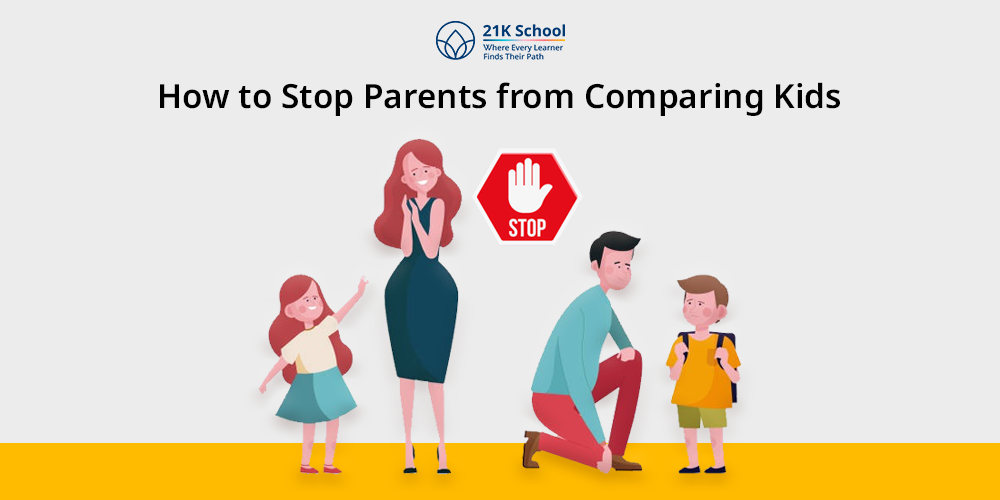
Each child is unique. They grow at their own pace and develop their strengths over time. But many parents, maybe without realising, compare their kids with others: siblings, cousins, classmates, or children online.
While this can sometimes feel innocent or motivational, comparing children can undermine their emotional development and worth.
While parents’ view on education vary, their rising concern of comparing their kids with others have several implications on young minds. They start to question their abilities, feel unloved, or that they are not enough.
In this blog, we will discuss the reasons why parents compare their children, its effects, and practical ways to stop comparison.
When parents put their energy into fostering individuality, they will raise kids who are confident, happy, and independent.
Explore top parenting tips for toddlers .
Contents
- Why Do Parents Compare Their Children?
- How to Stop Parents from Comparing Kids?
- 1. Recognise and Acknowledge When Comparisons Happen
- 2. Focus on Individual Strengths and Effort
- 3. Emphasise Effort and Progress
- 4. Celebrate Individual Milestones
- 5. Foster a Positive and Supportive Environment
- 6. Set Healthy Boundaries and Communicate Clearly
- 7. Model Positive Behaviours
- 8. Build Self-Esteem and Confidence
- The Negative Effects of Comparing Children
- Conclusion: Raising Confident and Independent Children
Why Do Parents Compare Their Children?
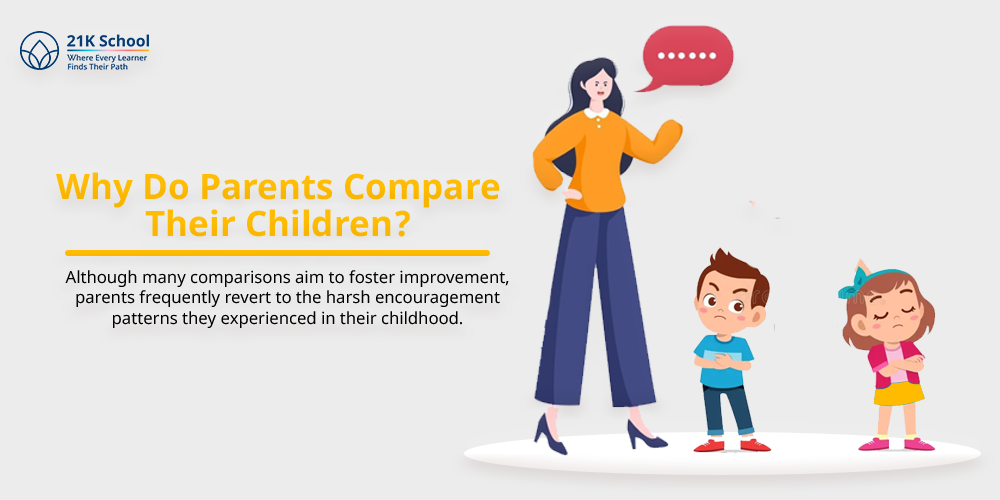
Although many comparisons aim to foster improvement, parents frequently revert to the harsh encouragement patterns they experienced in their childhood.
Additionally, contemporary parenting faces significant external pressures, ranging from social media and schools to society at large, making it easy for parents to grapple with questions and comparisons like, “Why isn’t my child achieving that too?”
Comparisons often shift from being supportive to sowing seeds of unhealthy competition.
Instead of inspiring behaviours to create engagement for growth, comparisons usually elicit feelings of stress, insecurity, and conflict.
Learn more on student stress here.
How to Stop Parents from Comparing Kids?
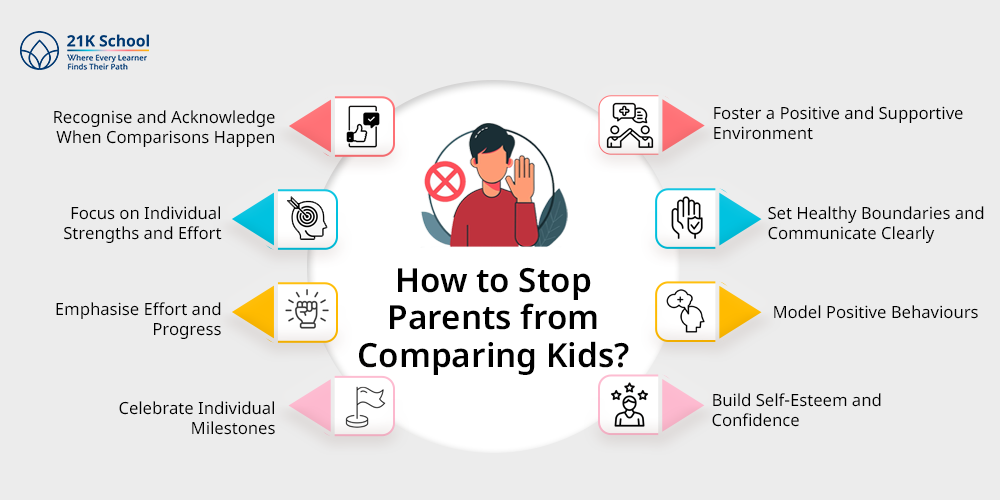
Let’s examine the different approaches parents can take to stop comparing kids and instead nurture their unique paths.
1. Recognise and Acknowledge When Comparisons Happen
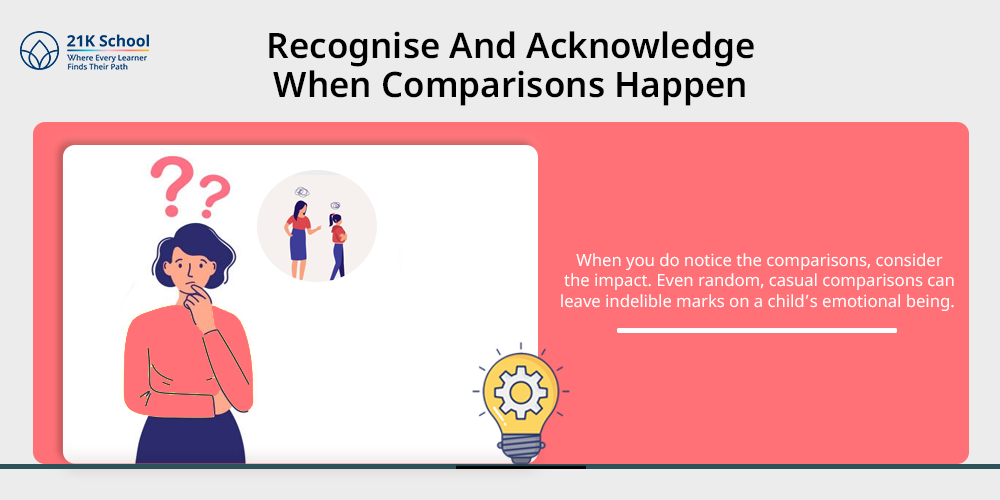
The first step is recognition. Pay attention to how many comparisons creep into our daily conversations – “Your brother never did that” or “Why can’t you be like your cousin?” may come from our lips without much thought.
When you do notice the comparisons, consider the impact. Even random, casual comparisons can leave indelible marks on a child’s emotional being.
Recognition allows some space between you and the words, and will enable you to flip the words, and choose encouragement over criticism.
2. Focus on Individual Strengths and Effort
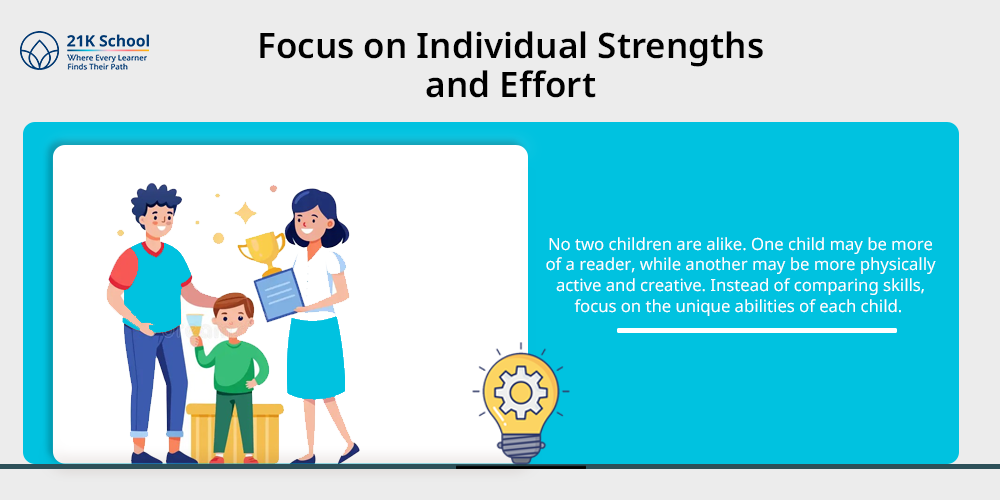
No two children are alike. One child may be more of a reader, while another may be more physically active and creative. Instead of comparing skills, focus on the unique abilities of each child.
Celebrate the good things about your child and recognise their effort. Instead of “I am proud that your brother got 10 goals at the game,” say “I am proud of the hard work and effort you have given in your game.”
This sends a stronger message to the child that who they are is more important than who they are compared to. The use of personalized learning is enhanced with focus on individual strengths.
3. Emphasise Effort and Progress
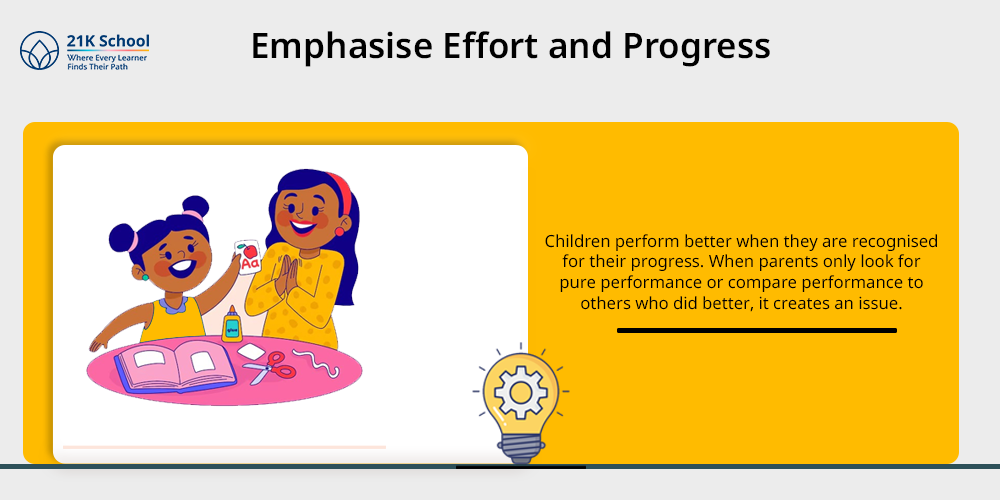
Children perform better when they are recognised for their progress. When parents only look for pure performance or compare performance to others who did better, it creates an issue.
There is a great potential to discourage a child or even create a fear of failure.
Try to focus on effort and progress. For example, “You are getting much better with your writing – I can see that you are putting in the work!” This does a lot for building a child’s confidence and resilience.
This teaches them it is OK to take their time to grow. You can further encourage kids to use the dedicated apps to track your study progress.
4. Celebrate Individual Milestones
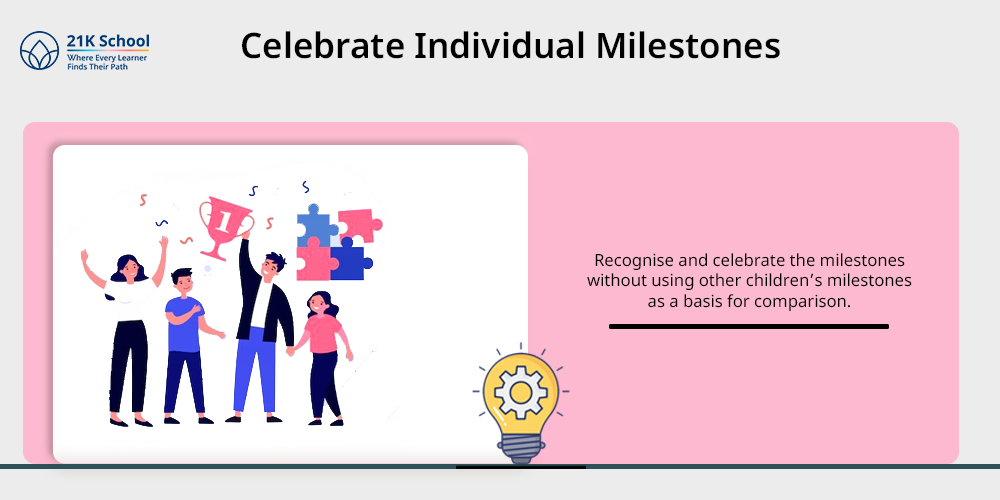
Children progress at their own rate. Some children may start speaking very early. Others may take their time and might not engage until they are comfortable with the new experience. This is healthy.
Recognise and celebrate those milestones without using other children’s milestones as a basis for comparison. Whether it is tying shoelaces, riding a bike, or making a new friend, let that milestone be a special moment in that child’s life.
This conveys to your child that they are appreciated for who they are, rather than compared by how fast they catch up with others.
5. Foster a Positive and Supportive Environment
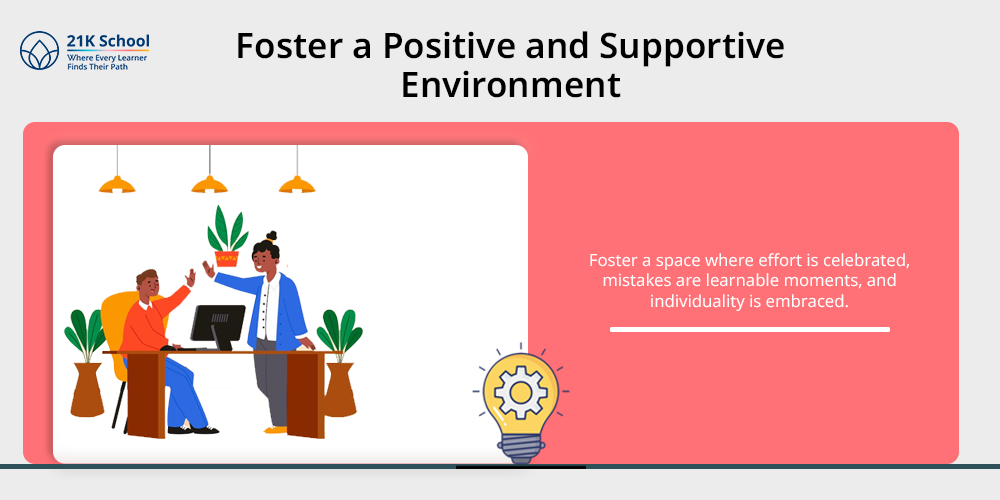
A positive learning environment at home is one where children feel safe, accepted, and loved unconditionally. Children can feel judged when they believe they are being compared or scrutinised constantly.
Foster a space where effort is celebrated, mistakes are learnable moments, and individuality is embraced. Help your child see that they do not have to fight for your approval.
6. Set Healthy Boundaries and Communicate Clearly
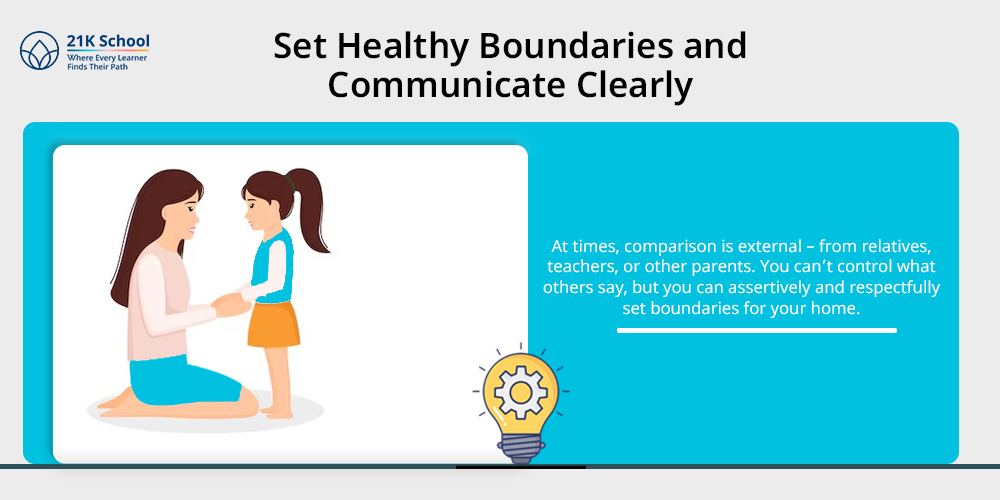
At times, comparison is external – from relatives, teachers, or other parents. You can’t control what others say, but you can assertively and respectfully set boundaries for your home.
If a comparative remark is made by someone, such as “Your son is not as outgoing as his cousin,” a calm response might be: “We are happy with how caring and thoughtful he is; everyone has their strengths.”
This validates your child and protects them from feelings of inadequacy while modelling confidence and kindness.
In your home, communicate clearly and respectfully. You might want to avoid tags like “the smart one” or “the shy one” since they can pigeonhole children into identities they didn’t ask for. Learn more on the importance of communication skills here.
7. Model Positive Behaviours
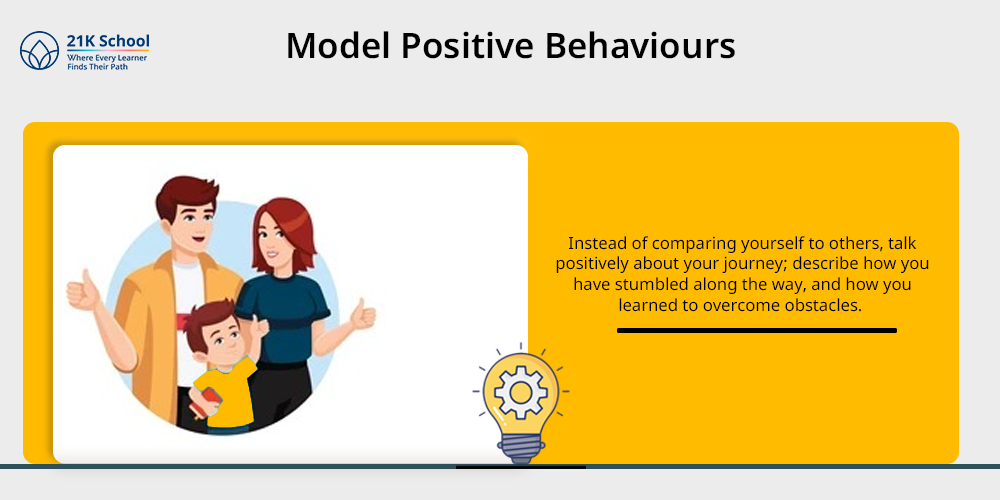
Children often take cues from how their parents act. If they overhear comparisons: “I’m not as good a parent as they are,” or “they make more money than I do.”, they might mirror the same behaviour.
Instead of comparing yourself to others, talk positively about your journey; describe how you have stumbled along the way, and how you learned to overcome obstacles.
Teach your child that everyone’s journey is different, and being true to yourself is more important than being the best. You will have set an important example, and your child will understand that their worth is not contingent on comparing themselves to others.
8. Build Self-Esteem and Confidence
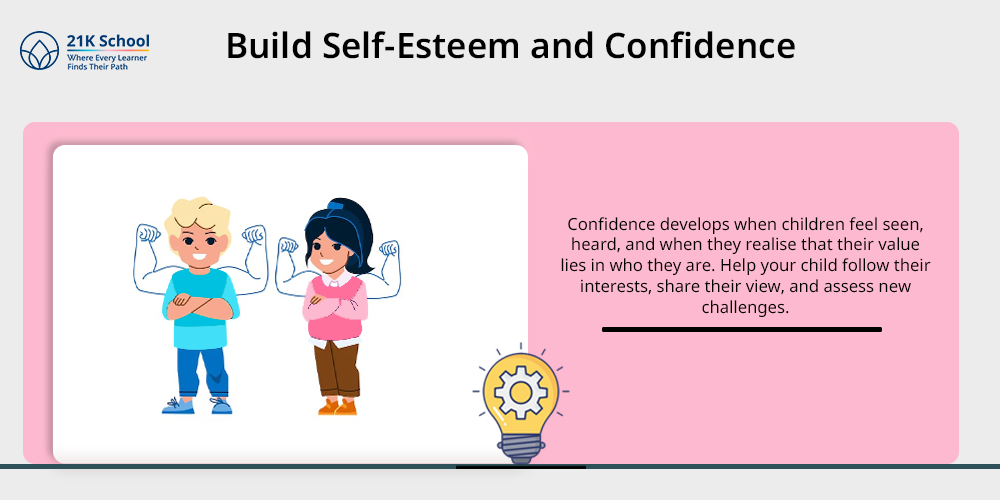
Confidence develops when children feel seen, heard, and when they realise that their value lies in who they are. Help your child follow their interests, share their view, and assess new challenges.
Celebrate their efforts, assist them in learning from their mistakes and remind them often that they are enough the way they are.
When a child feels secure in their identity, they are less likely to compare themselves to others. This security fosters their growth into kind, resilient, and confident individuals.
The Negative Effects of Comparing Children
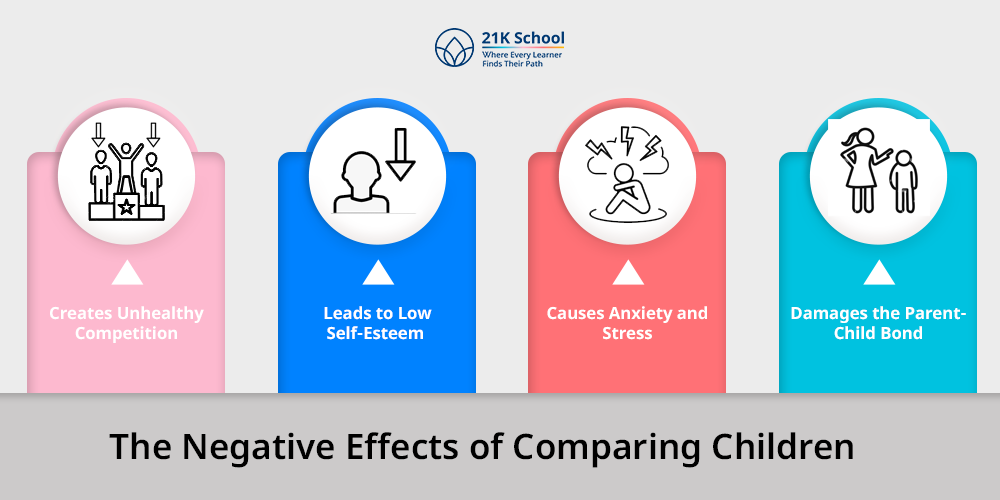
Let’s review the negative implications of comparing children, even if you are comparing with good intentions.
1. Creates Unhealthy Competition
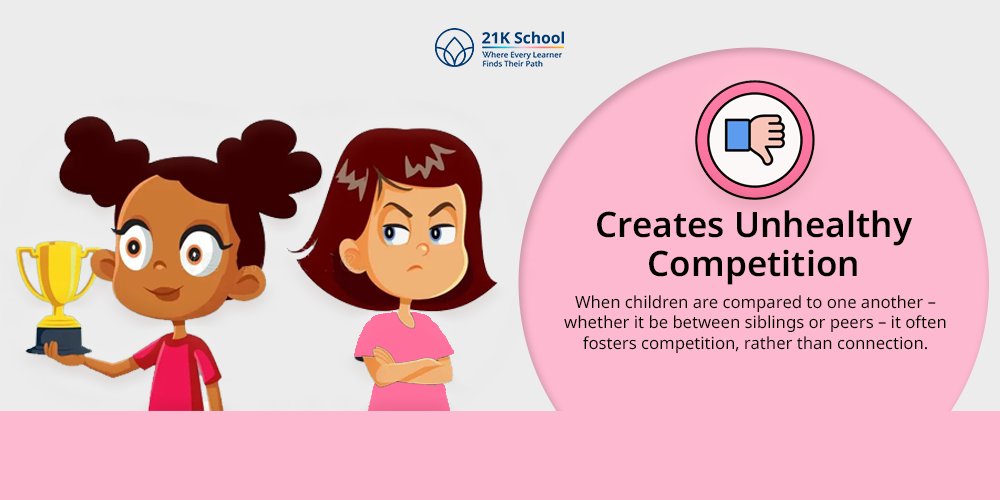
When children are compared to one another – whether it be between siblings or peers – it often fosters competition, rather than connection.
They begin to increasingly see the other as a threat, rather than an ally, which in turn fosters jealousy, resentment, and fighting.
This damages sibling relationships and friendships and decreases any potential for them to support one another. Healthy relationships are built on respect, not competition.
2. Leads to Low Self-Esteem
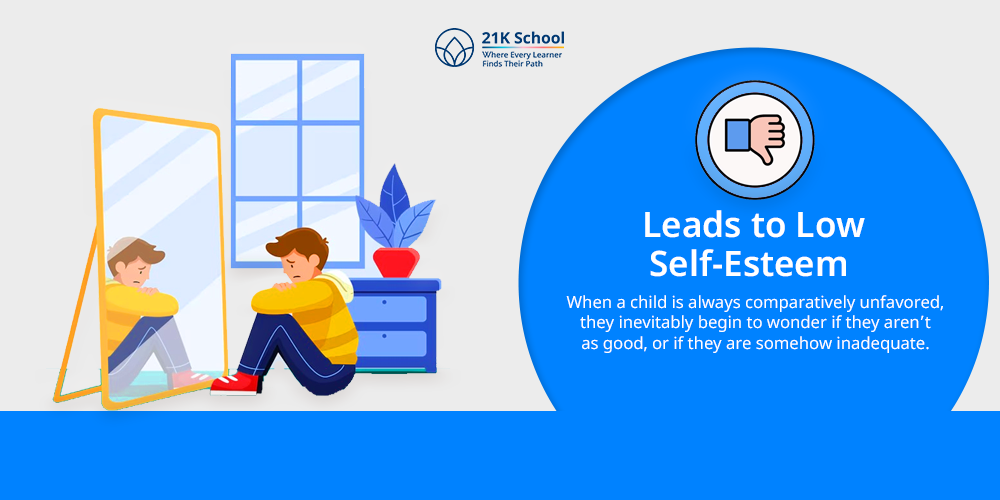
When a child is always comparatively unfavored, they inevitably begin to wonder if they aren’t as good, or if they are somehow inadequate.
This notion can easily take root within their identity and take years to outgrow, regardless of performance in school, friendships, or mental health.
Children absorb criticism rapidly, and what seems like a throwaway comment from a parent is usually most impactful on their self-esteem.
3. Causes Anxiety and Stress
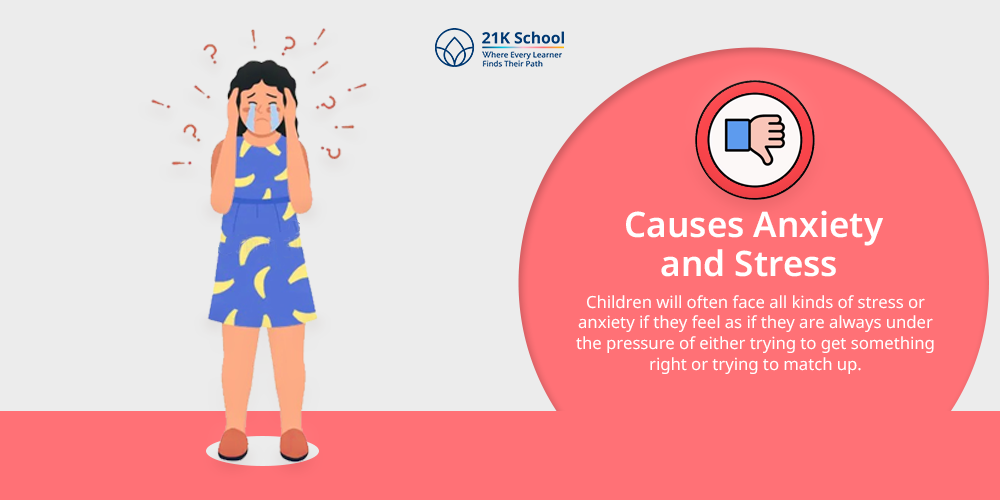
Children will often face all kinds of stress or anxiety if they feel as if they are always under the pressure of either trying to get something right or trying to match up.
They may feel they are constantly under a microscope, or they may fear disappointing you.
Over time, this can lead to avoidance, withdrawal, or emotional shutdown. Instead of thriving, they begin to focus on the other side of performance – fear of being compared, criticised, or left behind.
Know more about the causes of stress in students.
4. Damages the Parent-Child Bond
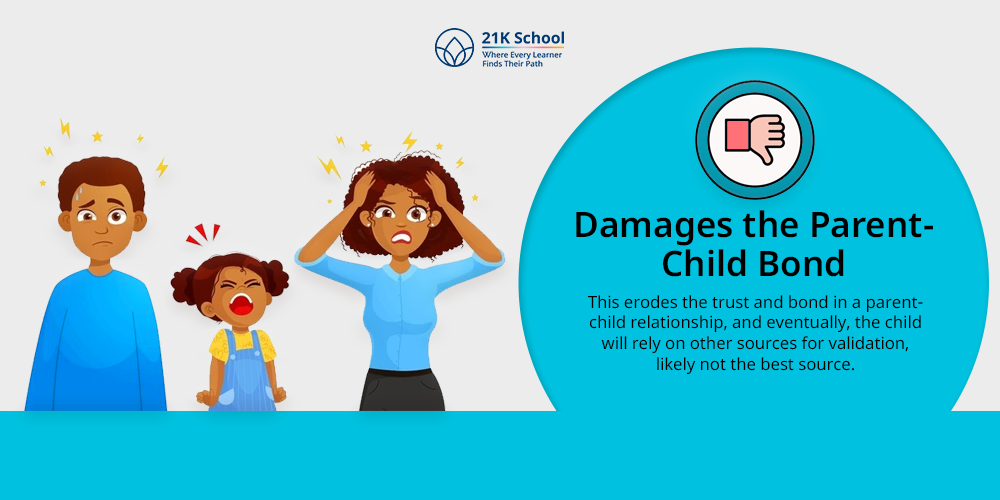
When a child begins to feel that they are never “as good as” someone, they may see little value in sharing their thoughts or experiences. Instead, they may feel disregarded, invisible, and incapable.
This erodes the trust and bond in a parent-child relationship, and eventually, the child will rely on other sources for validation, likely not the best source.
Conclusion: Raising Confident and Independent Children
When you disconnect comparison from parental engagement and replace it with embracing the uniqueness of your child, you allow them to be the best version of themselves, not someone else’s version of success.
Allow your words to lift them, your actions to empower them, and your home to be an environment in which they feel valued for who they are.
Building confidence in children begins at home by choosing acceptance over comparison.
